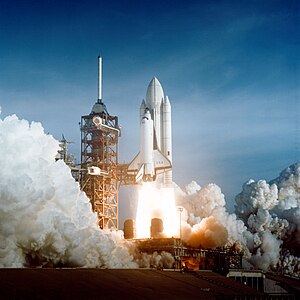Portal:Space exploration/Random Feature
Random Featured
Here, you find featured contents related to space exploration. Hit "" to see other contents.
Please, help Wikipedia by adding new great articles or improving existing ones! Also, check the Collaborate tab in this portal.
Featured article

Christopher C. Kraft, Jr. (born February 28, 1924) is a retired NASA engineer and manager. After graduating from Virginia Tech in 1944, Kraft was hired by the National Advisory Committee for Aeronautics (NACA), the predecessor organization to the National Aeronautics and Space Administration (NASA). He worked for over a decade in aeronautical research before being asked in 1958 to join the Space Task Group, a small team entrusted with the responsibility of putting America's first man in space. Assigned to the flight operations division, Kraft became NASA's first flight director. He was on duty during such historic missions as America's first spaceflight, first orbital flight and first spacewalk.
At the beginning of the Apollo program Kraft retired as a flight director in order to concentrate on management and mission planning. In 1972 he became director of the Manned Spacecraft Center (later Johnson Space Center), following in the footsteps of his mentor Robert Gilruth. He held the position until his retirement from NASA in 1982. During his retirement, Kraft has consulted for numerous companies including IBM and Rockwell International, and he published an autobiography entitled Flight: My Life in Mission Control.
Recently featured: Space Shuttle Challenger disaster – Atmospheric reentry – Apollo 8
| ...Archive | Read more... |
Featured picture

Launching of the NASA Space Shuttle Columbia on STS-1 in April 1981
Featured biography
Hermann Julius Oberth (June 25, 1894—December 28, 1989) was a German physicist, and one of the founding fathers of rocketry and astronautics.
In 1922, his doctoral dissertation on rocket science was rejected as "utopian". He had the 92-page work privately published as the controversial Die Rakete zu den Planetenräumen (By Rocket into Planetary Space). (In 1929, Oberth would expand this to a 429-page work entitled Wege zur Raumschiffahrt or Ways to Spaceflight.)
In autumn 1929, Oberth launched his first liquid fuel rocket, named Kegeldüse. He was helped in this experiment by his students at the Technical University of Berlin, one of whom was Wernher von Braun, who would later head the wartime project to develop the rocket officially called the A4, but far better known today as the V-2.
